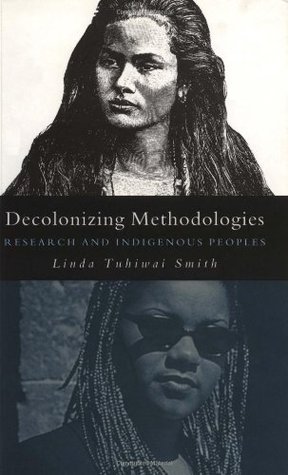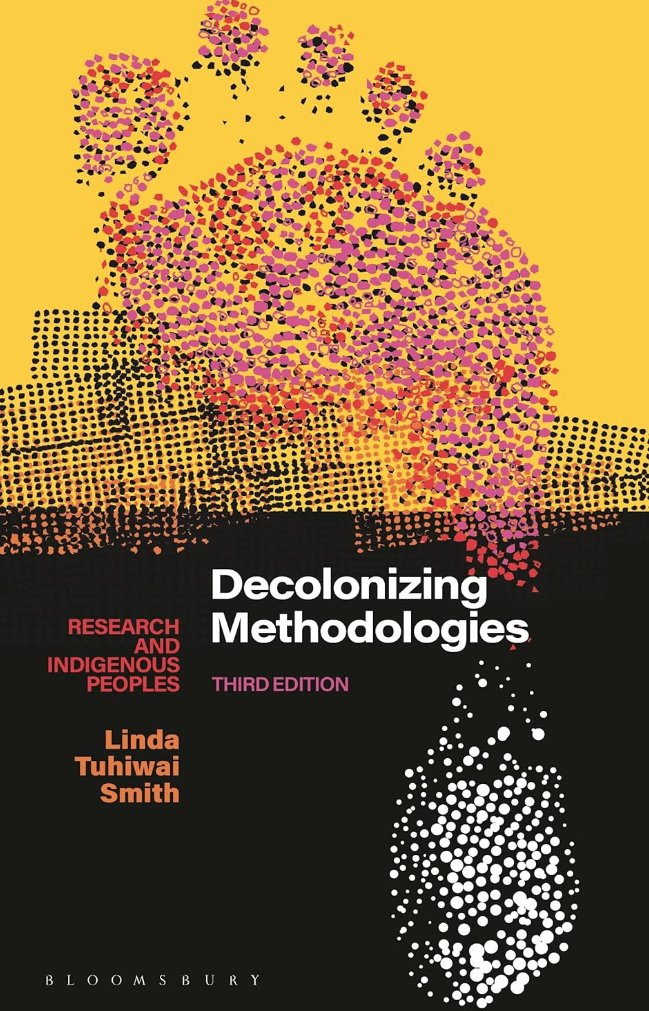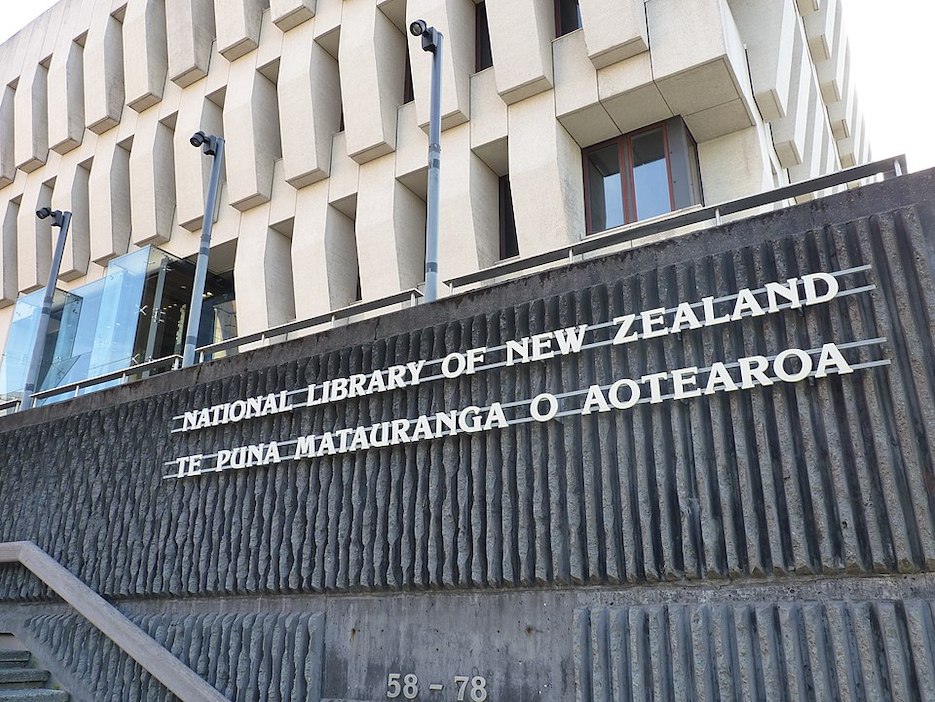

脱植民地化の方法論
Decolonizing
Methodologies, 1999,2021


☆ 『脱植民地化の方法論:研究と先住民』は、ニュージーランドの学者リンダ・トゥヒワイ・スミスによる著書である。1999年に初版が発行された『脱植民地 化の方法論』は、先住民研究の基礎となるテキストであり、植民地主義と研究方法論の交差点を探求している(→「先住民の脱植民地化」「知識の脱植民地化」)。
☆先住民による 脱植民地化(Indigenous decolonization) とは、先 住民のコミュニティの歴史や、植民地拡大、文化同化、搾取的な西洋の研究、そして必ずしもアプリオリではないが、しばしばジェノサイド(大量虐殺)の 影響に関する物語を再構築し、論争することを目的とした、現在進行中の理論的・政治的プロセスを指す。脱植民地化に取り組む先住民は、西洋中心の研 究手法や言説に対して批判的な立場を取り、知識を先住民の文化的な慣習の中に再配置しようとしている。 西洋の政治思想の構造に依存する脱植民地化の取り組みは、逆説的に文化的な所有権の剥奪をさらに進めるものとして特徴づけられてきた。この文脈において、 たとえこれらの実践が政治的な承認に容易に結びつかないとしても、独立した知的、精神的、社会的、物理的な回復と再生の取り組みを行うべきであるという呼 びかけがなされてきた。学者たちは、先住民の脱植民地化を「人種差別と性差別への取り組みなしには、すべての人々を解放することはできない」交差する闘い として特徴づけることもある。 先住民の脱植民地化運動の理論的な側面を超えて、脱植民地化のための直接行動キャンペーン、ヒーリング・ジャーニー、身体を伴う社会闘争は、現在も続く先 住民の抵抗運動や、土地所有権、生態系の採取、政治的疎外、主権をめぐる論争と関連していることが多い。先住民の抵抗運動は何世紀にもわたって続いてきた が、先住民の活動が活発化したのは1960年代で、これはアフリカ、アジア、アメリカ大陸における国民解放運動と時を同じくしていた(→「先住民の脱植民地化」「植民地主義に対する先住民の反応」)。
「知 識と、何が真の知識であるのかを定義する力は、植民地主義の認識論の核心にある。知識に関する批判的実践としての脱植民地化の方法論に取り組む研究者に とっての課題は、植民地主義と先住民の知識の概念の両方を扱いながら、一方を中心から外し、もう一方を中心に据えることである」(リンダ・トゥヒワイ・ス ミス 2025:11)
★ 第三版[邦訳]の序文(Pp.)の彼女から影響を受けた人たちの反応から「脱植民地の方法論」を考える
| 頁 |
人物(ページ) |
地域・エスニック背景 |
課題 |
|
| 13 |
マルティネス=クルズ(39)、ヴァスケズ(40) |
ニカラグア、ペルー、イギリス |
・ニカラグア政府と学生の対立(13-) ・暴力と覇権と軍事化のもとで、どのように研究が可能になるのか ・このような問題設定をたてた時点で研究の実践ははじまっている ・抑圧的な権力構造のなかでも、権力が否定する「認められないコミュニティ」が生み出す知識を探求しているからだ。 ・そこでは、方法論的な立場が必要になる。 ・制度的権力を批判する(15) ・社会問題を再構築する ・自分たちの実践を振り返る ・集団的な記憶について考える ・見る、感じる、考える、書く(15) ・植民地化に加担しない/植民者に加担しない ・古いカテゴリーに引き込まれないようにする(16) ・自分たちの内なる植民地主義を克服する。 |
・先住民の課題 |
| 17- |
リアン・マリー・チャーリー(38) |
タゲ・チョ・ファン、ユーコン、カナダ |
・同期に先住民がいない(17) ・自分の居場所がない→「脱植民地化の方法論」をよむ→先住民として挑戦し続けること意味 ・詩を書く→指導教員にコラージュだと指摘→コラージュに調べる→「先住民のコラージュ理論」について考える ・先住民のコラージュ論:1)代替的な統治形態を構築すること、2)故国を取り戻し、居住すること、3)複雑なコミュニティのなかで働くこと、4)遠くで 育ちながら帰国することを夢見る(19) ・リメンバリング:生まれた子どもの胎盤を枝にかける。最初にたべた動物は、その赤ちゃんとつながる(19-20)、自分たちが大地とのつながりをもつこ とを確認できた。 ・14年後:ユーコン大学の講師となる。学生のほとんどは先住民。現在は、学生が、ポジジョナリティ、権力、知の生産、コミュニティ中心の研究、入植者の 責任に関する課題に取り組んでいる(21) |
・先住民学 |
| 22 |
ジェイソン・デ・サントロ(39) |
ガワラとバルンガム、オーストラリア |
・映画制作とアクティビズム、そしてデザイン教育の実践に携わる
(22) ・つねに国家による暴力的抑圧を感じる ・脱植民地化研究を通して、擁護者と研究教育者の意味づけについての自分の理解は変わった(23) ・西洋の枠組みにとらわれないエンタイトルメントとそれを正当化する自己決定の復活 ・先住民たちの挑戦:物語、報告書、抗議活動、行動、法廷闘争、証言 ・先住民の運動を阻害するのは、政府の行動や無策である ・欠陥あるパラダイムの例:1)機能停止した調査、2)機能していない委員会、3)関心の埒外にある政治に乗っ取られた条約締結のプロセス(24) ・祖先たちの詩的なビジョンが必要(=脱植民地化研究は、西洋社会の審美性を欠いた冷たい実証主義ではなく、なんらかの美的運動でもある[可能性]) (24) ・「文化は汚染よりもつよい」(24) |
|
| 25 |
スウィーニー・ウィンドチーフ(41) |
ナコダ、(アメリカ合衆国) |
・ウィンドチーフは大学院教育でSTEM教育をおこなう(25) ・まわりの環境が非先住民的ななかで先住民の文化をどのように支えていくのかについて対話型教育と通して考えている。 ・経験的に、言語がその文化の固有の意識を形成することに確信している(→言 語相対説) ・先住民の学者が、システムの道具とならないように、この本は主張している(27) ・誰が研究の便益を受けるのか?アカデミーが先住民の学者を推奨しようとする場合の、(先住民自身による)コミュニティへの説明責任についてのリマイン ダーを説明している。 ・非先住民の学者のコミュニティに対する(特に害を及ぼす可能性のある場合での)説明責任が問われている(27) |
|
| 27- |
ホセ・カラビアス(38) |
イゴロット・カンカナエイ(Igorot Kankanaey)
人・フィリピン |
・野菜栽培の修士論文(28)——自分の研究が祖先についての知識探求
の契機になる ・非先住民の調査者に自分がアイデンティファイしたことに気づく(28) ・自分はインサイダーでありアウトサイダーであるが、非先住民の研究法を体現することで、アウトサイダーな視点でインサイダーを見ていたことに反省 (28) ・それまでの方法を転換してオートエスノグラフィーとして書く。 ・博士論文はディアスポラ・イゴロット女性について(29) ・「都市で育ったイゴロット二世にとって、研究は帰郷だ。「研究し返す(リサーチ バック)」ことは、西洋の研究方法への私たちの批判的な応答であるだけでなく、自分たちのコミュニティに戻るための方法でもある。私たちの方法論の脱植民 地化には、必然的に私たち自身の脱植民地化を伴う。この本が、私たちの先住民コミュニティをさらに強化し、真の意味で故郷(ホーム)に帰るという責任と挑 戦を引き受けた世界中の先住民学者の間で研究ネットワークを築く一助となることを願っている。」(30) |
|
| 30 |
イオケパ・カサンバル=サンザール(38) |
ハワイ |
・西洋の知識生産に対するスミスの容赦のない批判(30)→︎知識の脱植民地化. ・表紙のサングラスをかけた女性のイラストにかっこいいと思う ・この本をつかい、また教鞭をとる(31) ・西洋の思考規範を解体する/帝国の視点を通した研究をよぶものを解体する(→パースペクティヴィズム/脱構築) ・スミスの指摘のなかに、知識が西洋と先住民の間では階層化されることがあることを明確に指摘する(31) ・植民地主義の想像力から、先住民の知識へのシフトが必要(31-32) ・博士論文で、マウナケアの望遠鏡建設をめぐる政治について研究する ・天文学研究は人類の普遍的な研究と位置付けされて、それに反対する先住民の側を反科学や野蛮に分類されるという事態がある(32) ・スミスによると、この普遍的人間性は西洋人だけのもので、先住民は「完全な人間」とはみなされない——このことが先住民を遠くに置き、否定し、排除する 理由とされてきた。 ・直接的な非暴力、儀礼の実践、国家との訴訟は、非合理で不誠実で時代遅れとみなされて日常的には嫌悪されている(=未開性の残存)。このフレイミングを 打破する方法はどこにあるのか? ・「しかし、詳しく検討すると」、このことが入植植民地の形成を支持し、アメリカ合衆国のハワイ占領を肯定し、資本主義の覇権を維持するために機能し、人 間の知識や階層を再創造するプロセスに加担していることに気づくはずだ(=このような知識取得を得るのはどのようにして、また、それは西洋人も先住民も 「平等に」得られる認識か?) ・土地への愛着=アロハ・アイナ(33) ・彼のマウナケアの望遠鏡建設をめぐる政治の研究は、大学をより包摂的な「ハワイの学びの場」にすることではない(33) ・研究は、ハワイの人のためにおこなわれるべきことだ(33)——白人の研究にノーをつきつける(→「ハウナニ=ケイ・トラスク」) ・西洋人が用意する「客観性」ではなく、カナカ(ハワイ先住民)の声を中心にして、祖先の知識を搾取から守ろうとすること(33-34) ・スミスによると、「脱植民地化は、可能性の言語、すなわち植民地主義から抜け出す道を模索しなけばならない」と主張(スミスの弁ではなく文献は、スピ バック「ポストコロニアル 批評」収載論文を指定している) |
|
| 34- |
ヴェロニカ・タファイ(40)ほか |
アオテア
ロア(ニュージーランド) |
・「気をそらす政治」が、先住民に対する抑圧状況を変えない(35) ・古い祖先の教えプラス近年の学者たちによる情報は、知的財産の構築であり、また継承への責任をともなう ・リンダの指摘する「時間、空間、主観性」の概念の異なる捉え方に気づくことが重要である |
|
| 36 |
トウプ、ワイルア、マウリ |
・パケハ=白人の権力を理解すること・教えること<先住民の精神的・感
情的・霊的な特質を理解することの重要性 |
||
| 36 |
タプ、ワナ、カワ |
・祖先の教えにもとづき、知識をえる倫理ガイドラインをつくり、ネー
ションや文化をこえた研究を実施すること(36-37) ・時間、空間、主観性の長期的なビジョンを得る |
||
| 37 |
ワイアプ、コーカー、フフア |
・この本を読むあなたの心を開き、苦痛や不安をやわらげるために、わた
したちのコミュニティはある(37) |
☆先住民による先住民のための研究:リグニー(1997)、ナカタ(2007)、そしてトゥヒワイ・スミス(2013)
1)アッサンブラージュ的思考:関係性と分散させた主体性に焦点があてられる
2)先住民方法論:先住民の知識、視点、存在論を優先し、研究者による事前決定ではなく、参加者の物語や経験からテーマを浮き彫りにする方法
☆章 立て(あとでもう一度再掲)
++
| Decolonizing
Methodologies: Research and Indigenous Peoples is a book by
New Zealand academic Linda Tuhiwai Smith. Originally published in 1999,
Decolonizing Methodologies is a foundational text in Indigenous studies
that explores the intersections of colonialism and research
methodologies. Summary The book begins with the line "The word itself, 'research', is probably one of the dirtiest words in the indigenous world's vocabulary." Smith contends that Western paradigms of research are "inextricably linked to European imperialism and colonialism." The book contains an overview of Māori research outlining Māori cultural values and attitudes development to create a research framework that supports research by Māori scholars in Māori subject areas.[1] Smith concludes the book by articulating how she believes Kaupapa Māori research methods could be implemented. Impact and reception Decolonizing Methodologies offers a vision of kaupapa Māori research that has been enormously influential. Ranginui Walker described the book as "a dynamic interpretation of power relations of domination, struggle and emancipation".[2] Laurie Anne Whitt praised the book as a "powerful critique of dominant research methodologies."[2] Linda Tuhiwai Smith was awarded the top honour the Rutherford Medal in 2023 by the New Zealand science academy Royal Society Te Apārangi.[3] They said: Decolonising Methodologies, Research and Indigenous Peoples (1999) has had a profound influence across the social sciences. (Royal Society Te Apārangi 2023) The book has been translated into five languages.[3] It is widely referenced by other scholars and by the end of 2023 it had been cited 283,000 times.[3] New Zealand historian Peter Munz decried the book's political agenda, noting "what the author calls “colonising” research amounts to nothing more than subjecting a culture’s parochial self-image to critical scrutiny. Such research is emancipatory in the sense that it is likely to weaken old habits and beliefs and encourage the parochial society’s smooth transition into a wider, possibly global, community. To call it “colonising” is nothing less than emotional politics".[4] A review by Carla Wilson at the New Zealand Government agency Ministry of Social Development explores the book with a lens of how non-indigenous and Pākehā researchers may be guided in research with indigenous communities. Wilson's review states the prime focus of the book is on '"insider" research within indigenous communities', so did not address this question in detail,[1] and found it the book had: a valuable reminder of the need to reflect on, and be critical of, one's own culture, values, assumptions and beliefs and to recognise these are not the "norm". (Carla Wilson 2001) In 2021 the Spanish translation of the book, A descolonizar metodologías, published by LOM was brought by Elisa Loncón to the "plurinational library" of the Constitutional Convention of Chile.[5] Critical theory Decolonization Decolonization of knowledge Tikanga Māori |
『脱植民地化の方法論:研究と先住民』は、ニュージーランドの学者リン
ダ・トゥヒワイ・スミスによる著書である。1999年に初版が発行された『脱植民地化の方法論』は、先住民研究の基礎となるテキストであり、植民地主義と
研究方法論の交差点を探求している。 概要 この本は、「『研究』という言葉自体が、先住民の言語の中で最も汚れた言葉の一つである」という一文で始まる。スミスは、西洋の研究パラダイムは「ヨー ロッパ帝国主義と植民地主義と密接不可分」であると主張している。 この本には、マオリ文化の価値観と態度の発展を概説し、マオリの学者によるマオリのテーマの研究を支援する研究フレームワークを作成するためのマオリ研究 の概要が記載されている[1]。 スミスは、カウパマオリの研究方法をどのように実施できると考えているかを説明し、この本を締めくくっている。 影響と評価 『脱植民地化の方法論』は、非常に大きな影響力を持つカウパマオリ研究の方法論のビジョンを示している。Ranginui Walkerは、この本を「支配、闘争、解放の力関係をダイナミックに解釈したもの」と評した[2]。Laurie Anne Whittは、この本を「支配的な研究手法に対する強力な批判」と賞賛した[2]。 Linda Tuhiwai Smithは、2023年にニュージーランド科学アカデミーRoyal Society Te Apārangiから最高栄誉であるラザフォードメダルを授与された[3]。彼らは次のように述べた。 『脱植民地化の方法論、研究、先住民』(1999年)は社会科学全般に多大な影響を与えた。(王立協会 Te Apārangi 2023) この本は5言語に翻訳されている[3]。 他の学者たちからも広く引用されており、2023年末までに28万3,000回引用されている[3]。 0回であった[3]。 ニュージーランドの歴史家ピーター・マンズは、この本の政治的意図を非難し、「著者が「植民地化」と呼ぶ研究は、文化の偏狭な自己イメージを批判的に精査 すること以上のものではない。このような研究は、古い習慣や信念を弱め、偏狭な社会が広く、おそらくはグローバルなコミュニティへと円滑に移行することを 促すという意味で、解放的である。それを「植民地化」と呼ぶのは、感情的な政治に他ならない。 ニュージーランド政府機関である社会開発省のカールラ・ウィルソンによる書評では、先住民ではない研究者やパケハの研究者が先住民コミュニティの研究を行 う際に、どのような指針となるかを考察している。ウィルソンの書評によると、この本の主な焦点は「先住民コミュニティ内の「内部者」による研究」であり、 この問題については詳しく触れていない[1]。 この本は、自身の文化、価値観、思い込み、信念について考え、批判的に捉え、それらが「普通」ではないことを認識する必要性について、貴重な気づきを与え てくれる。(カーラ・ウィルソン 2001年) 2021年、LOM社から出版された同書のスペイン語訳『脱植民地化の方法論』は、エリサ・ロンコンによってチリ憲法制定会議の「多民族図書館」に届けら れた[5]。 批判理論 脱植民地化 知識の脱植民地化 マオリの伝統 |
| https://en.wikipedia.org/wiki/Decolonization_of_knowledge |
|
| Linda Tuhiwai
Te Rina Smith CNZM (née Mead; born 1950), previously a professor of
indigenous education at the University of Waikato in Hamilton, New
Zealand,[2][3][4] is now Distinguished Professor at Te Whare Wānanga o
Awanuiārangi. Smith's academic contribution is about decolonising
knowledge and systems. The Royal Society Te Apārangi describes Smith’s
influence on education as creating "intellectual spaces for students
and researchers to embrace their identities and transcend dominant
narratives".[5] Early life and education Smith was born in Whakatāne,[6] New Zealand. Her father is Sidney Moko Mead of Ngāti Awa, also a professor, and her mother is June Te Rina Mead, née Walker, of Ngāti Porou.[7] She was given the name Tuhiwai as an adult.[7] Smith affiliates with the Māori iwi Ngāti Awa and Ngāti Porou from the east cape of the North Island in New Zealand.[5] When Smith was a teenager, she moved to the US while her father was completing his PhD. Her family lived in southern Illinois and she attended Carbondale Community High School. In her time in the U.S. education system, Smith gained a newfound confidence as a learner.[6] Smith later moved to Salem, Massachusetts, where she worked as an assistant at the Peabody Museum of Salem, typing labels in the basement.[8] Upon her return to New Zealand, she applied her value of the confidence of students to New Zealand students, especially Maori students. In the 1970s, Smith was a founding member of the activist group Ngā Tamatoa.[9] She was influenced by texts by Malcolm X and Frantz Fanon. Her role in Ngā Tamatoa was to communicate with Maori people about the Treaty of Waitangi. Smith saw education as the most important part the Maori struggle for freedom.[6] She was a member of Ngā Tamatoa while a university student.[7] Smith earned her BA, MA (hons), and PhD degrees at the University of Auckland. Her 1996 thesis was titled Ngā aho o te kakahu matauranga: the multiple layers of struggle by Maori in education.[10][11] Career Smith is the Pro-Vice Chancellor Māori, Dean of the School of Māori and Pacific Development and Director of Te Kotahi Research Institute at the University of Waikato.[12] Smith's book Decolonising Methodologies, Research and Indigenous Peoples was first published in 1999.[13] In the 2013 New Year Honours, Smith was appointed a Companion of the New Zealand Order of Merit for services to Māori and education.[14] In 2017, Smith was selected as one of the Royal Society Te Apārangi's "150 women in 150 words", celebrating the contributions of women to knowledge in New Zealand.[15] In November 2016 she was appointed a member of the Waitangi Tribunal.[16] In the same year she retired Pro Vice Chancellor Māori and took a short-term contract as Professor of Māori and Indigenous Studies in the newly formed Faculty of Māori and Indigenous Studies.[17] In September 2020 the hashtag #BecauseOfLindaTuhiwaiSmith went viral when Smith was one of a group of academics who wrote an open letter to the Ministry of Education on racism in education[18] and news that her contract would not be renewed. A report commissioned by the University of Waikato into claims in the letter found that the institution is structurally discriminatory against Māori[19] but did not support other claims in the letter.[19] In 2021, Smith joined Te Whare Wānanga o Awanuiārangi as Distinguished Professor.[20] She became the first Māori scholar to be elected into the American Academy of Arts & Sciences in 2021.[1] The Rutherford Medal, the top honour from the Royal Society Te Apārangi was awarded to Smith in 2023, "for her preeminent role in advancing education and research for Te Ao Māori, her groundbreaking scholarship in decolonisation of research methodologies, and her pioneering contribution to transforming research for Indigenous Peoples globally".[21] She said of this award: "I think it’s important for us for Māori, for indigenous peoples, to have our knowledge recognised, and to occupy and create spaces inside the big institutions of knowledge." (Linda Tuhiwai Smith, 2023)[22] Decolonizing Methodologies Main article: Decolonizing Methodologies Smith is the author of Decolonising Methodologies, Research and Indigenous Peoples (Zed Books, 1999, 2012, and 2021), a critical analysis of the role of Western scholarly research played in the process of colonization of indigenous cultures. This work is considered a major contribution to research methods in social justice research.[13][23][24] In a 2023 news item the Royal Society Te Apārangi notes it has been translated into five languages and has 283,000 citations to date.[5] Personal life Smith is married to fellow academic Graham Smith.[4] Selected works Smith, Linda Tuhiwai. Decolonizing methodologies: Research and indigenous peoples. Zed Books Ltd., 2013. Denzin, Norman K., Yvonna S. Lincoln, and Linda Tuhiwai Smith, eds. Handbook of critical and indigenous methodologies. Sage, 2008. Smith, Linda Tuhiwai. On tricky ground: Researching the native in the age of uncertainty. N. Denzin & Y. Lincoln (Eds.) The Landscape of Qualitative Research." (2008): 113–143. Smith, Linda Tuhiwai. Kaupapa Māori research: Reclaiming indigenous voice and vision (2000): 225–247. Cram, Fiona, Linda Smith, and Wayne Johnstone. Mapping the themes of Māori talk about health. (2003). Smith, Linda Tuhiwai. Building a research agenda for indigenous epistemologies and education. Anthropology & education quarterly 36, no. 1 (2005): 93–95. https://en.wikipedia.org/wiki/Linda_Tuhiwai_Smith |
リ
ンダ・トゥヒワイ・テ・リナ・スミス(旧姓ミード、1950年生)は、以前はニュージーランド・ハミルトンにあるワイカト大学の先住民教育学の教授だった
が[2][3][4]、現在はテ・ワハレ・ワナング・オ・アワヌアランギの名誉教授である。スミスの学術的貢献は、知識とシステムの脱植民地化に関するも
のである。王立協会テ・アパランギは、スミスが教育に与えた影響について、「学生や研究者がアイデンティティを受け入れ、支配的な物語を乗り越えるための
知的空間」を創出したと説明している[5]。 生い立ちと教育 スミスはニュージーランドのワカタネで生まれた[6]。父親は同じく教授のNgāti Awaのシドニー・モコ・ミード、母親はNgāti Porouのジュン・テ・リナ・ミード(旧姓ウォーカー)である[7]。彼女は成人後にトゥヒワイという名を与えられた[7]。スミスは、ニュージーラン ド北島の東端にあるマオリ族の部族、Ngāti AwaとNgāti Porouの出身である[5]。 スミスが10代の頃、父親が博士号取得のためにアメリカに滞在していたため、スミスもアメリカに移住した。彼女の家族はイリノイ州南部に住んでおり、彼女 はカーボンデール・コミュニティ高校に通っていた。アメリカで教育を受けたことで、スミスは学習者としての新たな自信を手に入れた[6]。スミスはその後 マサチューセッツ州セーラムに移り、セーラム・ピーボディ博物館で地下のラベル入力の助手として働いていた[8]。ニュージーランドに戻った後、彼女は ニュージーランドの学生、特にマオリ族の学生たちに、学生としての自信という価値観を応用した。 1970年代、スミスは活動家グループ「Ngā Tamatoa」の創設メンバーであった[9]。彼女はマルコムXとフランツ・ファノンの著作に影響を受けた。Ngā Tamatoaにおける彼女の役割は、マオリ族の人々とワイタンギ条約についてコミュニケーションをとることだった。スミスは、マオリ族の自由を求める闘 いにおいて、教育が最も重要な要素であると考えていた[6]。彼女は大学生時代にNgā Tamatoaのメンバーであった[7]。 スミスはオークランド大学で学士号、修士号(優等)、博士号を取得した。1996年の論文のタイトルは「Ngā aho o te kakahu matauranga: the multiple layers of struggle by Maori in education(マオリ族の教育における闘いの重層性)」であった[10][11]。 経歴 スミスは、ワイカト大学マオリ族副学長、マオリ族・太平洋開発学部長、テ・コタヒ研究所所長である[12]。 スミスの著書『Decolonising Methodologies, Research and Indigenous Peoples』は1999年に初めて出版された[13]。 2013年の新年叙勲で、スミスはマオリ族と教育への貢献により、ニュージーランド勲章コンパニオン章を授与された マオリ族と教育への貢献が認められたためである[14]。2017年、スミスはニュージーランドにおける知識への女性の貢献を称えるロイヤル・ソサエ ティ・テ・アパランギの「150人の女性150の言葉」の1人に選ばれた[15]。 2016年11月、彼女はワイタンギ裁判所のメンバーに任命された[16]。同年、彼女はマオリ族副学長を退任し、新たに設立されたマオリ族・先住民学部 でマオリ族・先住民学教授として短期契約を結んだ[17]。 マオリ族副学長を退任し、新たに設立されたマオリ族・先住民学部でマオリ族・先住民学教授として短期契約を結んだ[17]。 2020年9月、スミスが教育における人種差別について教育省に公開書簡を書いた学者グループの一員であったこと[18]、そして彼女の契約が更新されな いというニュースが報じられた際、#BecauseOfLindaTuhiwaiSmithというハッシュタグが話題となった。手紙の主張についてワイカ ト大学が委託した報告書では、同大学が構造的にマオリ族に対して差別的であることが明らかになった[19]が、手紙の他の主張については支持しなかった [19]。 2021年、スミスはテ・ワレ・ワナンガ・オ・アワヌアランギの名誉教授に就任した[20]。彼女は2021年にアメリカ芸術科学アカデミーに選出された 初のマオリ族学者となった[1]。2021年に、 王立協会から最高の名誉であるラザフォード・メダルがスミスに授与された。このメダルは、「Te Ao Māori(マオリ族の教育と研究の発展における彼女の卓越した役割、研究方法論の脱植民地化における彼女の画期的な研究、そして先住民族のための研究を 世界的に変革する彼女の先駆的な貢献)」に対して贈られたものである[21]。スミスは、この受賞について次のように述べている。 「マオリ族や先住民族にとって、自分たちの知識が認められ、大きな知識の機関の中に自分たちの居場所を確保し、創造していくことはとても重要なことだと思 う。」(リンダ・トゥヒワイ・スミス、2023年)[22] 脱植民地化の方法論 メイン記事:脱植民地化の方法論 スミスは『Decolonising Methodologies, Research and Indigenous Peoples』(Zed Books、1999年、2012年、2021年)の著者であり、この本は、先住民族文化の植民地化プロセスにおいて西洋の学術研究が果たした役割を批判 的に分析したものである。この作品は、社会正義研究における研究手法への大きな貢献とみなされている[13][23][24]。2023年のニュース記事 で、王立協会テ・アパランギは、この作品が5言語に翻訳され、これまでに28万3千回の引用があるとしている[5]。 私生活 スミスは、同じ学者のグラハム・スミスと結婚している[4]。 主な著作 スミス、リンダ・トゥヒワイ。 Decolonizing methodologies: Research and indigenous peoples. Zed Books Ltd., 2013. デンジン、ノーマン・K、イヴォンナ・S・リンカーン、リンダ・トゥヒワイ・スミス編。 Handbook of critical and indigenous methodologies. Sage, 2008. スミス、リンダ・トゥヒワイ。 On tricky ground: 不確かな時代における先住民の研究。N. Denzin & Y. Lincoln (Eds.) The Landscape of Qualitative Research." (2008): 113–143. Smith, Linda Tuhiwai. Kaupapa Māori research: Reclaiming indigenous voice and vision (2000): 225–247. Cram, Fiona, Linda Smith, and Wayne Johnstone. マオリ族の健康に関する話題のマッピング。 (2003) Smith, Linda Tuhiwai. Building a research agenda for indigenous epistemologies and education. Anthropology & education quarterly 36, no. 1 (2005): 93–95. |
| Summary To the colonized, the term 'research' is conflated with European colonialism; the ways in which academic research has been implicated in the throes of imperialism remains a painful memory. This essential volume explores intersections of imperialism and research - specifically, the ways in which imperialism is embedded in disciplines of knowledge and tradition as 'regimes of truth.' Concepts such as 'discovery' and 'claiming' are discussed and an argument presented that the decolonization of research methods will help to reclaim control over indigenous ways of knowing and being. Now in its eagerly awaited third edition, this bestselling book includes a co-written introduction and features contributions from indigenous scholars on the book's continued relevance to current research. It also features a chapter with twenty-five indigenous projects and a collection of poetry. Index
|
概要 植民地化された人々にとって、「研究」という言葉はヨーロッパの植民地主義と混同される。学術研究が帝国主義の苦悩に関与してきたことは、今も痛ましい記 憶として残っている。本書は、帝国主義と研究の交差点を探求する本質的な一冊である。特に、帝国主義が「真実の体制」として知識と伝統の分野に組み込まれ ている方法について論じている。「発見」や「主張」といった概念が論じられ、研究方法の脱植民地化が、土着の知覚や存在のあり方に対する支配を取り戻すの に役立つという主張が提示されている。待望の第3版となるこのベストセラー本には、共著の序文が含まれ、土着の学者たちによる寄稿が、本書が現在の研究に も引き続き関連していることを示している。また、25の土着のプロジェクトと詩のコレクションを収録した章も含まれている。 索引
|
| Decolonizing process as counter-narrative | カウンターナラティブとしての脱植民地化の過程 |
| A
counter-narrative is a story or perspective that challenges a dominant
or commonly accepted narrative, often representing the experiences and
viewpoints of marginalized groups. It aims to offer a different
understanding of a situation, event, or phenomenon by questioning
established narratives and promoting inclusivity. |
カ
ウンターナラティブとは、支配的または一般的に受け入れられている物語に異議を唱える物語や視点のことで、多くの場合、周縁化されたグループの経験や見解
を表しています。確立された物語に疑問を投げかけ、包括性を促進することで、状況、出来事、現象について異なる理解を提供することを目的としています。 |
| Here's a more detailed
explanation: Key aspects of a counter-narrative: Challenge to Dominant Narratives: Counter-narratives actively resist and question narratives that are widely accepted, often reflecting power structures and historical biases. Focus on Marginalized Voices: They center the experiences and perspectives of groups that have been historically excluded or misrepresented, such as people of color, LGBTQ+ individuals, or those with disabilities. Promote Equity and Inclusion: By offering alternative viewpoints, counter-narratives can help create more inclusive and equitable environments by acknowledging diverse experiences and challenging systemic inequalities. Examples: Counter-narratives can be found in various forms, including personal stories, academic research, artistic expressions, and social justice movements. Purpose of Counter-Narratives: Truth-telling: They can expose hidden truths and challenge misinformation, particularly in contexts where dominant narratives have been used to perpetuate harmful stereotypes or justify oppression. Social Change: By raising awareness and fostering critical thinking, counter-narratives can contribute to broader social change and promote a more just and equitable society. Resilience: They can empower individuals and communities by validating their experiences and offering a sense of hope and agency. In essence, counter-narratives are not just different stories; they are powerful tools for social transformation, challenging dominant narratives and promoting a more inclusive and equitable world. |
より詳しい説明は、以下の通りです。 カウンターナラティブの重要な側面 支配的なナラティブへの挑戦 カウンターナラティブは、権力構造や歴史的な偏見を反映していることが多い、広く受け入れられているナラティブに積極的に抵抗し、疑問を投げかけます。 周縁化された声に焦点を当てる カウンターナラティブは、有色人種、LGBTQ+、障害者など、歴史的に排除されたり、誤って表現されてきたグループの経験や視点に焦点を当てます。 公平性と包摂性の促進: カウンターナラティブは、別の視点を提供することで、多様な経験を認め、体系的な不平等に挑むことにより、より包摂的で公平な環境の構築に貢献することが できる。 例: カウンターナラティブは、個人的な体験談、学術研究、芸術的表現、社会正義運動など、さまざまな形で見られる。 カウンターナラティブの目的: 真実の告発: カウンターナラティブは、特に、有害な固定観念を永続させたり、抑圧を正当化するために支配的な物語が利用されてきた状況において、隠された真実を暴露 し、誤った情報に挑戦することができます。 社会の変化: カウンターナラティブは、意識を高め、批判的思考を育むことで、より広範な社会の変化に貢献し、より公正で公平な社会を促進することができます。 回復力(レジリエンス): カウンターナラティブは、個人やコミュニティの経験を肯定し、希望と主体性を与えることで、彼らに力を与えることができます。 本質的に、カウンター・ナラティブは単なる異なる物語ではない。それは社会変革のための強力な手段であり、支配的な物語に挑戦し、より包括的で公平な世界 を推進するものである。 |
| アオテアロア(Aotearoa,
マオリ語: [aɔˈtɛaɾɔa]; 英語話者の一般的な発音[ˌaʊtɛəˈroʊ.ə] (
音声ファイル))は、ニュージーランドのマオリ語での名称である。もともとはマオリの人々が北島のみを指して使っていたが、19世紀後半以降、この言葉は
国全体を指すようになった。原義には諸説あり、通説では「長く白い雲」を意味する[1]。これは、ポリネシア人が初めてニュージーランドを見つけた際の雲
の形を表している。 20世紀後半から、「アオテアロア」は、国の組織や機関のバイリンガルでの名称として広まりつつある。1990年代以降、ニュージーランドの国歌「神よ ニュージーランドを守り給え」(または「アオテアロア」)をマオリ語と英語の両方で歌うのが慣習であり[2]、名前をより多くの聴衆に広めている。 |
|
| 語源 Aotearoa の本来の意味は知られていない。単語は ao「雲、夜明け、昼間、世界」、tea 「白、透明、明るい」、roa「長い」と分割できる。あるいは Aotea-roa として分解することもでき、その場合はAotea = ニュージーランドに移住するカヌーのワカ(英語版)、roa「長い」となる。一般的な訳は「長く白い雲の土地」である[1]。または、ポリネシア北部で見 られる短い日と比較した場合の、ニュージーランドの日光の長さと質を指す「長い明るい世界」や「安定した日の土地」と訳すこともできる。 いくつかの伝統的な物語では、アオテアロアは探検家クペのカヌーの名前で、彼はそれにちなんで土地に名前を付けた。クペの妻(一部のバージョンでは、彼の 娘)は地平線を見て "He ao! He ao!"(「雲!雲!」)と呼んだ。他の説では、カヌーは昼間は長く白い雲に、夜は長く明るい雲に導かれていたという。到着した途端、クペの乗組員には長 い雲が垂れ下がってきた。雲はクペの注意を引き、彼は「確かにこの地点は大地である」と言った。雲が彼らを迎えたので、クペはその土地をアオテアロアと名 付けた。最初に発見された土地は、それに応じて Aotea(雲)と名付けられ、現在は Great Barrier Island となっている。アオテアの先にもっと大きな陸地が見つかったとき、それは Aotea-roa アオテアロア(長い Aotea)と呼ばれた[note 1]。 |
|
| 使用法 マオリがいつ彼らの口頭伝承に名前を取り入れ始めたかは知られていない。1845年から、ニュージーランド総督のジョージ・グレイは、マオリの伝説や歴史 に関する情報を収集するために数年を費やした。彼はそれを英語に翻訳し、1855年に "Polynesian Mythology And Ancient Traditional History Of The New Zealand Race"『ポリネシア神話とニュージーランド人種の古代伝統史』という本を出版した。文化の英雄であるマーウイ(Māui)への言及では、マオリ語のグ レイによる翻訳は次のように読まれた。 このようにして私たちが話したマウイは死んだ。しかし死ぬ前に彼は子供を持ち、息子が生まれた;彼の子孫には、まだハワイキに住んでいる者や、アオテアロ ア(や、これらの島)に住む者もいる;彼の子孫の大部分はハワイキに残ったが、数人がここアオテアロアにやってきた[3]。 「アオテアロア」を使用して国全体を指すのは、植民地時代以後の習慣である。ヨーロッパ人との接触期間以前は、マオリはニュージーランド列島全体で一般的 に使われる名前を持っていなかった。1890年代後半には、この名前は北島のみに言及して使用されていた。この使用例は、1893年2月8日に発行された マオリ語の新聞 Huia Tangata Kotahi の創刊号に掲載された。第一面には、「これは、北島と南島のマオリのための出版物である」という意味の "He perehi tenei mo nga iwi Maori, katoa, o Aotearoa, mete Waipounamu"[4]という献辞を掲げた。 欧州の入植者による、ニュージーランドという名前(Nova Zeelandia ノヴァ・ゼーランディアの英語化)の採択後は、全体として国を示すためにマオリが使用する一つの名前は「ニュージーランド」に発音が似た Niu Tireni[note 2]だった 。 その言葉の拡大された意味は19世紀後半に広まった。先住民土地裁判所判事トーマス・ヘンリー・スミスは、1878年に「神よニュージーランドを守り給 え」を翻訳した際、アオテアロアをニュージーランドの名前として使用した[5]。この翻訳は現在、マオリ語で国歌が歌われる際に広く用いられている [2]。また、ウィリアム・ペンバー・リーブスは1898年に出版したニュージーランドの歴史書『The Long White Cloud Ao-tea-roa』の中でニュージーランドにアオテアロアという言葉を使用している[note 3]。  ニュージーランド国立図書館の外にある二言語表示の標識は、ニュージーランドと一緒に「アオテアロア」を使用している。 20世紀以来、「アオテアロア」は、ニュージーランド国立図書館(Te Puna Mātauranga o Aotearoa、テ・プナ・マータウランガ・オ・アオテアロア)など、各国の組織のバイリンガル名に広まっている。[6] 2015年、マオリ語週間を祝うため、クリケットのニュージーランド代表チームであるブラックキャップスは、ジンバブエとの最初の試合で「アオテアロア」 という名前でプレーした[7]。 |
|
| 2018年の請願 2018年に、ニュージーランドの公式名が「アオテアロア」を含むように変更すべきかどうかについての国民投票のために、ダニー・タハウ・ジョベによって 請願が開始された[8]。請願書は、2019年2月28日に終了するまでに6,310の署名が書かれた[9]。請願書は、2019年5月1日にアオテアロ ア・ニュージーランド緑の党共同党首であるマラマ・デヴィッドソン(Marama Davidson)によってニュージーランド議会に提出され[9]、提出および検討のために議会のガバナンス・管理選択委員会に付託された[9]。 |
|
| 音楽 「アオテアロア」は1940年にダグラス・リルバーンによって作曲された序曲である 「The Land of the Long White Cloud 'Aotearoa'」は、1979年にフィリップ・スパークによって作曲された、ブラスバンドまたはウィンドバンド用の作品である。 「アオテアロア」という名前は、ニュージーランドのバンド Split Enz が彼らの歌「リーキー・ボートの6ヶ月」の歌詞で使用したときに、いくつかの著名を得た (1982) 「Aotearoa/Land of the Long White Cloud」は、ニュージーランドの歌手ジェニー・モリスの1989年の独創的なアルバム Shiver の歌の名前だった Two Aotearoa Sketches for Bassoon and Piano (2004) は、ファゴット奏者 Michael Burns が作曲した2つの作品である。 ニュージーランドの電子バンドである Minuit は、2009年のアルバム Find Me Before I Die A Lonely Death.com で「Aotearoa」という曲をリリースした。 「アオテアロア」は、スタン・ウォーカーがリリースした2014年の曲で、リア・ホール、トロイ・キンギ、メイジー・リカをフィーチャーしている 「Millenium-Aotearoa Mix」は、1994年に英国のポストパンク/インダストリアルバンドキリング・ジョークによってリリースされた曲である。 |
|
| 神よ
ニュージーランドを守り給え |
|
| 1.^
アオテアロアという語の由来については、他にもいくつかの説がある。その信憑性は様々だ。南島に関連し、高い雪山や長い南半球の夕暮れを連想させる説は、
マオリ族がアオテアロアを北島のみを指す言葉として使っていた事実から、疑わしいと考えねばならない。ある説では、この名は航海に由来するとされている。
船から初めて陸地を認める際、島の上空に浮かぶ雲が最初の兆候となる。北島の山脈は時に、長いレンズ雲の定常波を生み出す。別の説は北島火山高原の山々に
関わる。特定の年には、山々が限られた期間だけ雪を被ることがある。この説では、雪に慣れていないポリネシアの航海者たちが、これらの雪を被った峰々を長
い白い雲と見間違えた可能性を指摘している。第三の仮説は、ポリネシアの航海者たちが熱帯地域から来たことを前提とする。熱帯では夕暮れが短く、夜が急速
に訪れる。一方、温帯のニュージーランドでは夕暮れが長く続き、夏の日照時間も長い。したがって「アオテアロア」は「長く光る空」と訳されるという。 2.^ 綴りは様々で、例えばニュージーランド独立宣言とワイタンギ条約のマオリ語版には「ヌ・ティラニ」という異形が見られる。いずれの綴りであれ、マオリ族が 英語からの音訳を好まなくなったため、この名称は現在ほとんど使われていない。 3.^ 長き白き雲(アオテアロア)はプロジェクト・グーテンベルクでオンライン閲覧可能である。 |
|
| 1.^ a b McLintock, A. H., ed.
(1966). “Aotearoa”. An Encyclopaedia of New Zealand. Te
Araより2020年7月19日閲覧. 2.^ a b “God Defend New Zealand/Aotearoa | Ministry for Culture and Heritage” (英語). mch.govt.nz. Ministry for Culture and Heritage. 2017年4月29日閲覧。 3.^ Grey. “Polynesian Mythology and Ancient Traditional History of the New Zealand Race”. New Zealand Texts Collection, Victoria University Of Wellington. 2013年4月27日閲覧。 4.^ “Huia Tangata Kotahi”. New Zealand Digital Library, University of Waikato.. 2019年4月7日閲覧。 5.^ “History of God Defend New Zealand”. Ministry for Culture and Heritage. (2011年10月27日). 2012年9月26日閲覧。 6.^ “National Library of New Zealand (Te Puna Mātauranga o Aotearoa) Act 2003”. legislation.govt.n. Parliamentary Counsel Office (2003年5月5日). 2018年12月5日閲覧。 7.^ “New Zealand to play as Aotearoa”. ESPNCricinfo. 2015年7月27日閲覧。 8.^ “Petition for referendum to include Aotearoa in official name of New Zealand”. Stuff.co.nz. (2019年2月1日) 2019年5月5日閲覧。 9.^ a b c “Petition of Danny Tahau Jobe - Referendum to include Aotearoa in the official name of New Zealand”. New Zealand Parliament (2018年5月23日). 2019年4月20日閲覧。 |
|
| https://x.gd/tQRR2 |
★
「カウパパ(kahupapa)・
マオリ」とは、ニュージーランドの先住民であるマオリの文化やアイデンティティを指す言葉である。マオリ語の「kāupaapa」(カウパパ)は「基盤」
「基礎」「歴史」などを意味し、これに「マオリ」が加わることで、「マオリの歴史、文化、価値観の全体」といったニュアンスになる。具体的には、マオリ族
のアイデンティティ、言葉、歴史、伝統的な芸術、社会構造など、マオリの文化のすべてを包括する概念である。
★
(審問):人類学の脱植民地化は、人類学の植民地主義的手法のリヴァースエンジニアリングで、明らかにされうるか?(→「人類学と植民地主義」)
リ ンク
文 献
そ の他の情報
Copyleft, CC, Mitzub'ixi Quq Chi'j, 1996-2099
☆
 ☆
☆